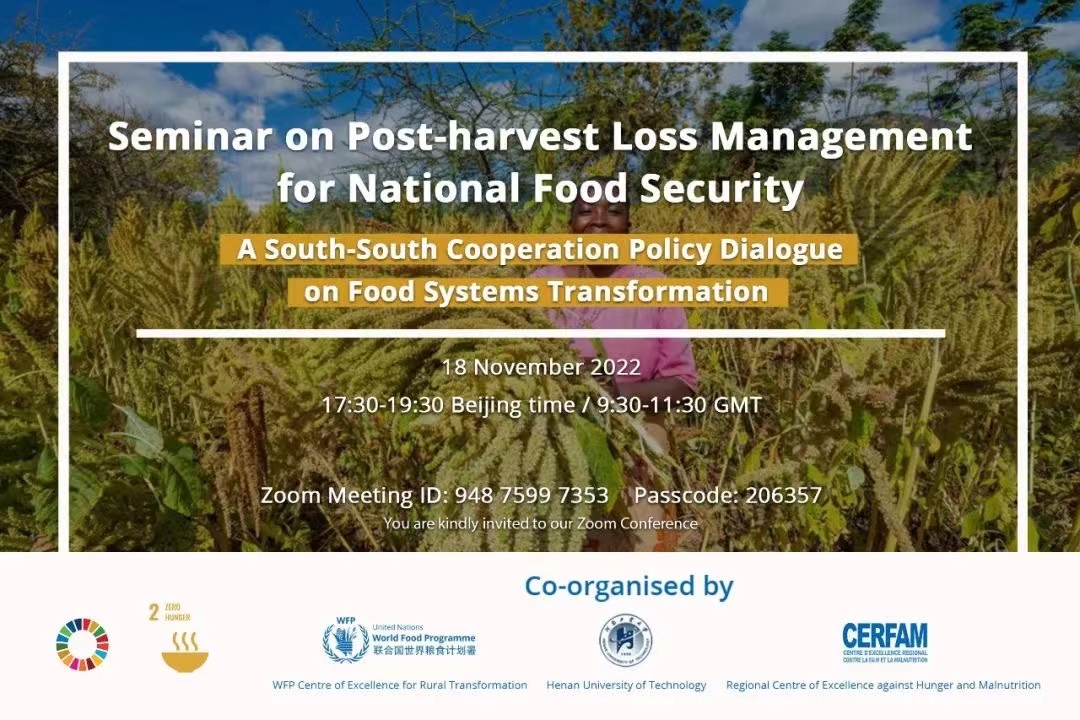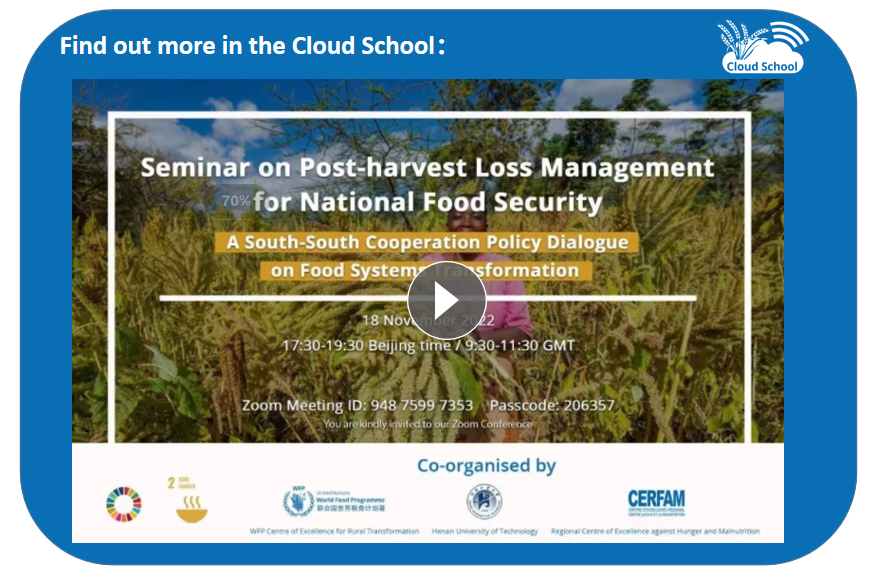
Background
Global Context
With a lot of uncertainties in the current context, the world is confronting unprecedent severe challenge of Food Security. Globally, levels of hunger remain alarmingly high. The 2021 Global Report on Food Crises highlights the remarkably 193 million people are in hunger in 55 countries/territories, driven by regional conflict, pre-existing and COVID-19-related economic shocks, and weather extremes. The outlook for global acute food insecurity in 2022 is expected to deteriorate. The alarmingly high incidence of acute food insecurity and malnutrition exposes the fragility of global and local food systems. The interconnectedness of the drivers compounds existing challenges faced by millions of acutely food-insecure people worldwide.
The first-ever UN Food Systems Summit was convened by the UN Secretary-General on 23-24 September 2021. The Summit aims to empower all people to leverage the power of food systems to drive our recovery from the COVID-19 pandemic and get back on track to achieve all 17 Sustainable Development Goals (SDGs) by 2030. As the anchor agency of Action Track 5, WFP underpins the ambitions on building resilience and mitigating shocks, understanding and addressing the drivers and root causes of food insecurity, strengthening national supply chains, supporting smallholder farmers, and reducing food loss and waste. An RBA plus ESCAP-CSAM on China's Good Practical on Food Loss and Waste was held online in China, drawing an international attention for wider collaboration under this theme.
The 8th Ministerial Conference of the Forum on China-Africa Cooperation (FOCAC) was held in Dakar, Senegal, from November 29th to 30th 2021. The Conference adopted Dakar Action Plan (2022-2024), which indicates the importance of China-Africa cooperation mechanism to further strengthen food security and support rural development in Africa. Leveraging China's technical support on food systems, storage and warehouse management to reduce food loss and strengthen food supply chain in Africa was highlighted at the conference.
Country Context in China
As the largest developing country, China is basically self-sufficient in food supply through hard working over the past decades and has enough food to feed its nearly 1.4 billion population. China's food security is a success of worldwide significance and is advancing along a steadier and wider path with Chinese characteristics. Meanwhile, as a major country that shoulders its responsibilities, China has always been a positive force in safeguarding world food security. China stands ready with the world to enhance international exchanges and cooperation, share experience and practices in the food industry, and implement the United Nations 2030 Agenda for Sustainable Development, making a positive contribution to safeguarding world food security and promoting common development.
In 2021, a thematic study on China's national grain reserves system was jointly conducted by WFP China Centre of Excellence for Rural Transformation (WFP China COE) and the National Food and Strategic Reserves Administration of the People's Republic of China (NAFRA). The outcome report Grain Storage & Grain Reserves System Sharing China's Experience for South-South Cooperation focuses on sharing China's experience and practices of national grain reserves system for food security.
Context in Other Developing Countries
In developing countries, especially Africa, small agricultural producers (farmers, fishers, meat and dairy producers) operating in traditional food supply chains are the principal suppliers of food but face high food loss under normal circumstances due to lack of technologies, infrastructure and transport systems and technical skills to cut losses that occur at post-harvest stage. This is expected to be more prevalent during the COVID-19 pandemic due to disruptions caused by government measures causing poor-to-no access to the necessary products and services.
Rationale
Grain reserves, as the key strategic materials of nations, have played an important role in safeguarding the grain market and social stability, protecting the interests of farmers and ensuring the national food security. National governments will need to pay special attention to the management of the grain reserves as an important economic task for the sake of national food security, in particular, under the special time of COVID-19. A strategic management of the national grain reserves and enabling policy structures for national reserves and food circulation and storage system should be in need for many countries.
China's experience in the past decades indicated that the grain reserves system improves the motivation of smallholder farmers for grow production. It provides a stable channel for grain purchase and storage, helps protect the interests and enthusiasms of smallholder farmers, while enhancing farmers' market access, which in turn effectively secures the steady management of grain reserves, thereby further promotes national food security.
WFP's smallholder and food systems support strategy (SAMS) provides guidance and technical support to country offices in designing smallholder and food systems outcomes relevant for country strategic plans, and designs/disseminates, with support from regional bureaus, tools to support implementation of SAMS for local and regional procurement and food systems coordination initiatives, allowing country offices achieve SDG targets. This is highly relevant to WFP China COE's South-South Cooperation engagement on food systems transformation. Leveraging China's knowledge and experience in aspect of Post-harvest Loss Management and Food Systems Transformation through South-South Cooperation is prioritized by WFP China COE and contributed to developing countries' food systems resilience.
Henan University of Technology (HAUT) is an academy jointly supported by the People's Government of Henan Province and NAFRA. The academy is identified as a strong technical partner for WFP China COE with strength especially on PHLM & Food Systems, since that HAUT has been committed to theoretic research and engineering technologies on post-harvest management and other food related areas. In addition, HAUT also has been long actively engaged in China aided training support for other developing countries. In October 2021, a Seminar was jointly organized by WFP China COE and HAUT on Food Systems Management.
The Regional Centre of Excellence against Hunger and Malnutrition (CERFAM) is a platform of exchanges, partnerships and cooperation, which aims to respond to the increasing demand of national governments for capacity strengthening, technical expertise, knowledge management, South-South cooperation and exchange, sharing of good practices and lessons learned in the fight against hunger and malnutrition. Post-harvest Loss Management in African countries is highly prioritized by CERFAM.
In this context, WFP China COE is partnering with HAUT, and CERFAM, to facilitate the knowledge and expertise exchange in Grain Reserves and Digitalised Technology for national food security. A Seminar on Post-harvest Loss Management for National Food Security (hereinafter referred as the Seminar) will be organised tentatively on 18 November 2022, which will target policy makers in developing countries looking for ways to develop their national strategies and policies by taking useful reference from China.
Objective
The Seminar aims to provide insightful discussions on national grain reserves system and digitalized technologies for food systems transformation. Through South-South Cooperation policy dialogue, this seminar is expected to exchange knowledge and experience on grain reserves management system to address current challenges and advance country-led progress towards effective grain reserves system and food security.
Specifically, the Seminar will explore to
▷ Introduce China's grain reserves system
▷ Flag the importance of well managed grain reserves system for national food security
○ Quality food supply chain
○ Challenge in food systems
▷ Digitalized technology for food systems transformation
○ Smart granary
○ Informatized tools and platforms for grain trade
Event arrangement
1. Timing of the Event
The Seminar will be scheduled from 17:30-19:30 Beijing time (GMT+8) on 18 November 2022.
2. Event Format
The Seminar is a combined event with on-site and online participation (Zoom Meeting) for duration of two hours.
3. Language
Chinese/ English/ French/ Spanish simultaneous interpretation will be provided.
4. Follow-up
The Seminar will feed the WFP-China South-South Cooperation Knowledge Sharing Platform and Cloud School courses. Relevant knowledge products including experts' presentations and reference materials will be shared with participants after the event.
Targeted Audience
Participants interested in grain reserves, storage management, PHLM for smallholder support, and food security policies are welcome to join the Seminar. The event is most recommended for policy and decision makers in agriculture departments, relevant technical staff, and leading smallholder farmers in developing countries.
The Seminar will invite participants to the on-site event include representatives from the MARA, NAFRA, and concerned technical partners in China.
Representatives from WFP Headquarters, Country Offices, African Union and ECOWAS will be invited to join the virtual session.
WFP Country Offices in Africa, Asia and Latin America regions are most encouraged to share the invitation with government partners in their host countries.


